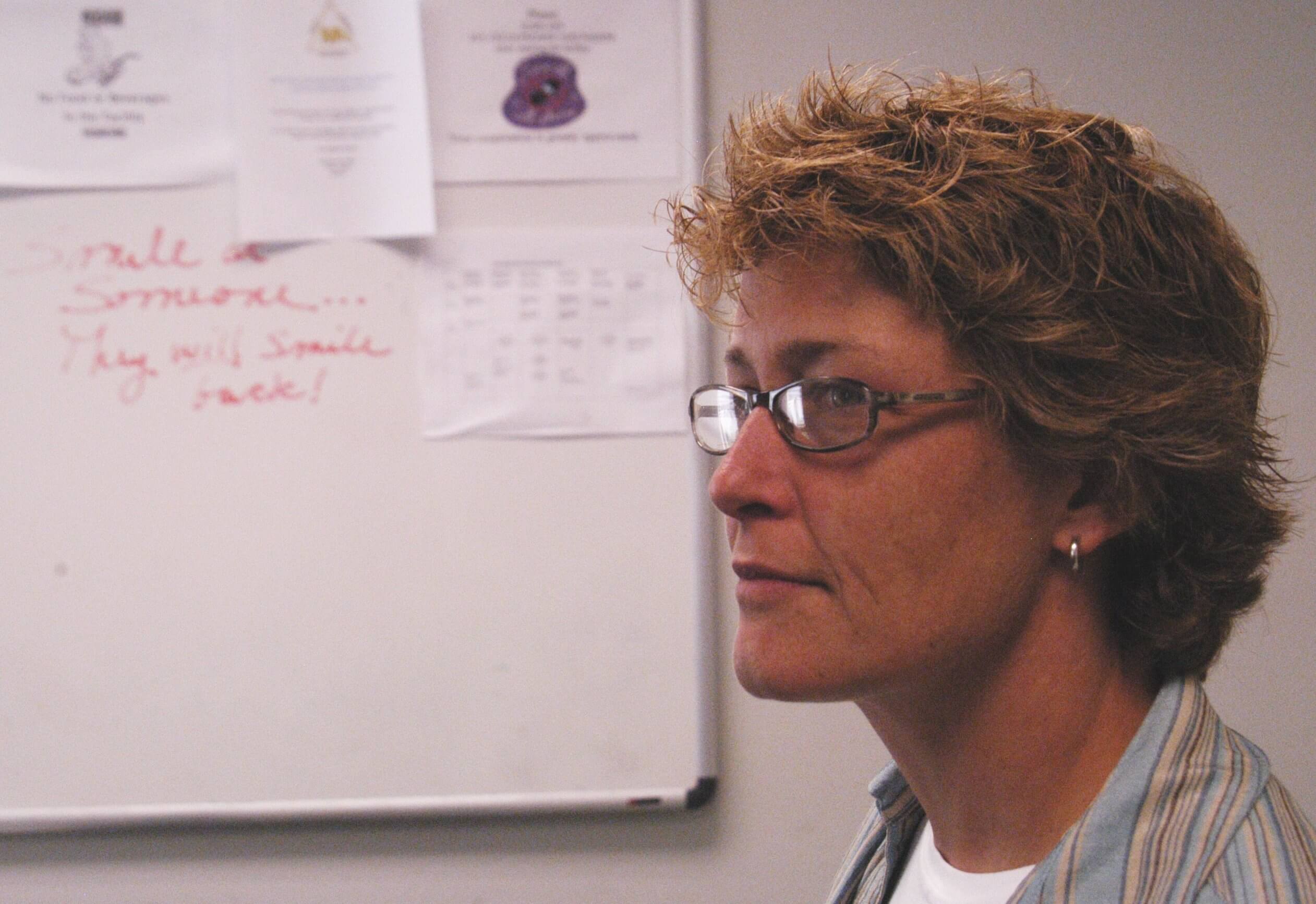BURLEIGH — Remember the AAA Building, 1200 Route 9 where motorists would go for road maps and travel plans?
Since earlier this year, a different clientele has entered the portals of that red brick building, now owned by Addiction Recovery Services.
They are recovering drug users seeking a road map out of their addictions. Most come early, the doors open at 6 a.m. Monday through Saturday, closed Sunday. Others come throughout the day, doors close at 8 p.m.
Many are like lepers, cast away by family and friends.
They form a surrogate family of brothers and sisters where no one judges, hates or chastises another.
Many of them have known life only as a hellish existence until they made a realization they cannot — did not — want to continue that lifestyle.
When that time comes, those who use heroin, cocaine or other opiates, who walk through the door, take the first step toward recovery and a new life.
They may even glance to their left as they enter and see a one-word wall decoration donated by a grateful patient, “HOPE.”
Few in the public, it seems, want to acknowledge them or their need for treatment, save for the counselors, staff and Dr. Ralph Aurigemma, medical director.
Aurigemma has followed in the footsteps of Dr. James Manlandro, who sold that portion of his medical practice, and who is no longer affiliated with Addiction Recovery Systems, which has another office in Somers Point.
Closed, too, is the much debated Rio Grande office on Route 47 at Oslo Avenue where patients were treated under Manlandro’s care in a building shared with Dr. James Walsh, a podiatrist.
For several years, Middle Township Committee was bombarded with complaints by neighborhood residents about that office’s operation, more specifically, actions of some patients outside the office.
As if in answer to prayers of many, the AAA building, which is zoned highway commercial, went up for sale. In that zone, methadone clinics are a permitted use.
The spacious office was retrofitted with mandated security features, counselor’s offices, and examination rooms.
Public transportation, which many recovering addicts use, regularly passes the building.
The Manlandro name, however, has not vanished from ARS. Today, Victoria Wells-Manlandro, niece of the founding physician, is executive director.
She worked in North Jersey when her uncle was initially opening both offices (here and in Somers Point).
Officials at A.R.S. asked if she wanted to “come back home,” and work, “Which I did without hesitation,” she stated.
She worked with her uncle since 2000 and remained with A.R.S. when the business changed hands.
Locally, A.R.S. has 151 patients who receive “medically assisted treatment,” and 70 who are outpatients and receive no medication, only counseling, Wells-Manlandro said.
Patient mix is 57 percent male, 43 percent female, whose ages range from 20-55.
Some patients enter the program of their own volition, others are referred for the methadone and suboxone program and outpatient programs by courts, physicians, children and family services or other agencies, Wells-Manlandro stated.
Those who undergo methadone treatment pay $175 admission fee, which includes a complete medical and biopsychosocial assessment and a week of medication.
After the first seven days, methadone patients pay $75 a week or $12 daily. They may do so for extended periods, since some need methadone as a maintenance medication, similar to insulin for a diabetic.
Those who can afford it, pay, but most health insurance plans will not cover methadone treatment, Wells-Manlandro said.
A.R.S. accepts government insurance such as Medicaid, Work First New Jersey Substance Abuse Initiative, and other public assistance grants.
“These are individuals who have extended periods of dependence on opiates and experience an overall improvement in their daily functioning and employability, they do not experience with not taking the medication,” said Wells-Manlandro.
There are others who require methadone or suboxone for shorter periods of time to “reap the benefits,” she added. They are generally persons whose substance abuse has not caused permanent changes in their brain chemistry or opiate receptor system, she added.
For at least two patients treated at A.R.S. in Burleigh, the program was credited with saving their lives, then turning them in a positive direction.
Patient 1
“I probably would be dead if they did not take me in. I might be in jail or dead if the clinic wasn’t here,” said a 40-year-old woman with bipolar disorder, also called manic-depression, who declined to give her name, but freely offered how the program, of which she has been a part for three years, changed her.
“I had a job interview yesterday,” she said Aug. 15.
“Of 12 people, I was the one (of 12) they picked for an interview,” she said with a smile.
“I would never have dreamed that when I was using heroin. I would never think about work. The only thing I would think about was that drug, and you don’t care who you hurt,” she said.
Free of drug use until she was 30, she said her father, now dead, chastised her, to no avail.
“My father would say other people are trying to live, and you are putting that (heroin) in your arm,” she recalled, as if his words were ringing in her ears.
Taking a dose of methadone daily affords her a sense of safety, she said. That’s because on the street, when she was stealing to buy drugs, she never knew if the drugs were safe, or if she’d be shot or arrested.
“This is one dose a day, and you don’t have to worry all day,” she added.
“You don’t know what you’re getting out there,” she added.
She recalled at first, “nodding off, and mainly, you’re out of it,” she said.
“Then, it becomes something you do to be normal, so you’re not sick,” she said.
Family relationships fall away, never to return, she said.
“No one wants to bother with you. You might get AIDS from the needles. Some people steal from their family. Some steal from their mother on her death bed,” she said.
Her brother, a quadriplegic for 20 years, after being shot in the neck over drugs, would plead with her not to use drugs. His pleas fell on deaf ears.
When she was finally brought to the A.R.S. clinic, she had lost weight, smelled, since she didn’t bathe, and was ill from a variety of conditions, she recalled.
Now that she’s on the road to recovery, with help from A.R.S. counselors, she said, life again offers hope.
“It’s like coming to heaven coming here,” she said.
“Everybody hugged me. They really helped me. The nurse practitioner realized I needed to be attended to immediately, so I was hospitalized,” she said.
Her advice to young people who may be considering drug use:
“You’ll be in jail, dead or in an institution. That’s what you have to look forward to if you use drugs,” she said.
“You will lose your family, and friends and your life, eventually. There are no friends when you use drugs. It’s all about money and drugs; there are no friends. It’s a horrible, horrible life. It crushes your dreams, you can kiss them goodbye,” she said.
“It’s fun ‘til you need to be normal. You’re walking around stoned, high, stealing and going to jail and looking behind your shoulders every day,” she said.
Patient 2
For Woodbine resident Fran Jefferson, being arrested for drug possession was, “A blessing in disguise. Believe it or not, it got me on the right track,” she said.
A recovering user of heroin in the A.R.S. treatment program, Jefferson has lived a life that drugs have tainted from the first sample of LSD she took while a student at Glassboro State College (now Rowan University.)
Now on methadone, Jefferson sees the A.R.S. program offers much more than a cup of cherry-flavored liquid daily.
“At first, I didn’t think it was anything but drink juice and go home,” she said in an interview at the Burleigh clinic she visits six days a week.
After sessions of group therapy, Jefferson realized something.
“For the first time, I didn’t want to get high. There is more to life than getting high. The methadone was a great help,” she said.
“I got clean and stayed clean,” she said, a reference to staying off the illegal drug she professed to “love” — heroin.
“I give all the credit to God, then the IOP (intensive outpatient program) and methadone,” she said.
“The program in itself gave me a desire to be straight and want to live right, and want to care about others again,” Jefferson said.
When she used drugs, she felt “isolated.”
“There will be a time when I get off it (methadone),” she promised.
Until that day, “I need that crutch to help me stay clean.”
She even believes she might be able to “make it” without methadone, since A.R.S. “has given me a foundation, a cornerstone.”
A drug user for 35 years, Jefferson now sees how her lifestyle affected her two sons.
The younger remains in prison; the elder was in prison, and has “turned his life around,” and gotten involved in a local church, she said.
To support her former habit cost $150-$200 daily. The money, she confessed, often came from those children, either in cash or on their credit cards.
She would send Western Union money-grams to herself, then use the proceeds to buy heroin.
“I don’t think I was a good mother,” she said, staring at the floor.
Although she worked at a large insurance company as a supervisor, weekends were her time to feast on methamphetamines.
“It affected my kids, because I would see things and hear things. I’d have them standing at the door waiting with pots and pans, waiting for the police to come,” she said.
“I thank God I changed,” she said.
“I never thought I could live a day without drugs of some sort, but I’ve done it,” she smiled.
“I feel accomplishment. I really have accomplished something,” she said.
Even now, though, the road to recovery is tenuous.
In July, Jefferson admitted to having a “hard problem,” which caused her to relapse.
“I messed up. It would have been one year clean on Aug. 15. I messed up, but now I’m back on the right track,” she said.
Jefferson also learned not to worry about the future.
When she told her counselor she was fearful of next July, she was advised, “Why worry about next July? Think about today, the next five minutes, or next half hour. Stay clean for this half hour,” she said.
“They give you a lot of tools here to help with your recovery. They also care about you. They are not just taking your money they care about you. It makes you feel good,” Jefferson said.
Jefferson learned from her 14-year-old granddaughter that the child surmised her grandmother was using drugs.
“She said, ‘You’d go into your bedroom, and say I’ll only be a minute, and come out nicer.’ They knew,” she said.








